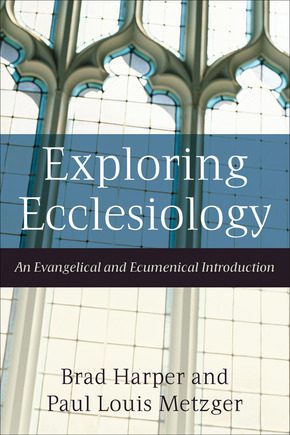 Contrary to what the word might sound like, ecclesiology is not a disease. Ecclesiology entails the doctrinal study of the church. The proper study of the church can help inform churches so as to nurture health and guard against spiritual diseases. This post originally appeared as “Between the Lines: a Conversation with Brad Harper and Paul Louis Metzger–Part 1” at The Brazos Blog on 2/17/2014. The post reflects facets and values of the book I co-authored with Brad Harper titled Exploring Ecclesiology: An Evangelical and Ecumenical Introduction (Brazos, 2009).
Contrary to what the word might sound like, ecclesiology is not a disease. Ecclesiology entails the doctrinal study of the church. The proper study of the church can help inform churches so as to nurture health and guard against spiritual diseases. This post originally appeared as “Between the Lines: a Conversation with Brad Harper and Paul Louis Metzger–Part 1” at The Brazos Blog on 2/17/2014. The post reflects facets and values of the book I co-authored with Brad Harper titled Exploring Ecclesiology: An Evangelical and Ecumenical Introduction (Brazos, 2009).
What is ecclesiology, and why should evangelicals care about it?
Ecclesiology is the study of the nature, mission, and life of the church. Evangelicals should care about it for several reasons.
1. The church alone is the bride and body of Christ—now and for eternity. The church is the kingdom community of the triune God. As such, it is very different from other social groupings such as national, regional, or local governments; NGOs; businesses; and nuclear families. As important as these other social groupings are, they should never displace the significance of the church for the individual believer.
2. We belong to the church as God’s people. As God’s people, we are not just a worldwide community of individual believers. We are a community unified under the lordship of Jesus Christ and by a biblical structure which includes, among other things, pastoral leadership, accountability and discipline, and the Word and Sacraments.
3. The Scriptures indicate that the church is a place of God’s unique presence and activity, a place where he engages us as he does nowhere else.
4. The church is not simply a localized and contextualized community for the present. It is also Christ’s community for all eternity. The church is the concrete embodiment of Christ’s eschatological kingdom. We should be participating now in the community that will be our eternal destiny.
How can the study of ecclesiology affect how we experience the church?
Answers to this question could take up many pages, so we will just suggest a few examples: All too often, the church in North America operates by way of pragmatic impulses rather than careful reflection that would benefit sustainable practices that cultivate healthy church growth for the long haul. Careful consideration of what the Scriptures and church leaders throughout the ages and across the globe have to say about the identity, mission, and life of the church can guard against short-term fixes that hurt long-term communal gains. Moreover, the study of the nature and role of church leadership can make a huge difference in how we experience church. For example, if the Bible invests pastors or elders with significant authority in the areas of doctrinal teaching and proper moral behavior, this will tend to cultivate unity of belief and behavior in the church. If, on the other hand, the authority of the Bible as understood by church members is valued over the authority of pastoral leadership, the church has more freedom to question pastoral teaching; having said that, such an emphasis may also give way to greater openness to doctrinal and ethical error.
The study of the Sacraments is also an area which can significantly affect the way we experience church.  Something as simple as coming to the conviction that the Lord’s Supper should be celebrated weekly instead of monthly or quarterly makes a significant difference in believers’ ecclesial experience. Further, if the sacraments are understood to be significant moments of the reception of grace rather than merely a time to remember Christ, this will likely affect the attitude of the believer in partaking in them. Lastly, it is important that we take to heart the significance of the table for calling sinners who are saints and saints who are sinners together to serve one another and to receive and offer forgiveness to one another as equals at the foot of the cross. Thus, in addition to confessing our sins to God, we confess our sins to one another so that we might be healed (James 5:16). Here we see the vertical as well as the horizontal significance of the table.
Something as simple as coming to the conviction that the Lord’s Supper should be celebrated weekly instead of monthly or quarterly makes a significant difference in believers’ ecclesial experience. Further, if the sacraments are understood to be significant moments of the reception of grace rather than merely a time to remember Christ, this will likely affect the attitude of the believer in partaking in them. Lastly, it is important that we take to heart the significance of the table for calling sinners who are saints and saints who are sinners together to serve one another and to receive and offer forgiveness to one another as equals at the foot of the cross. Thus, in addition to confessing our sins to God, we confess our sins to one another so that we might be healed (James 5:16). Here we see the vertical as well as the horizontal significance of the table.












